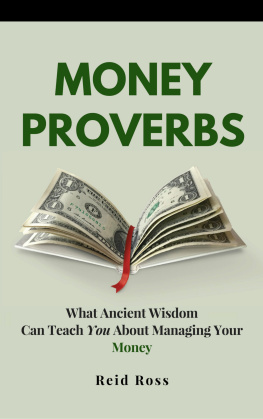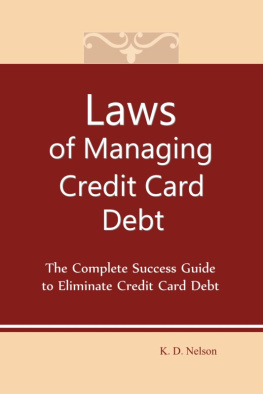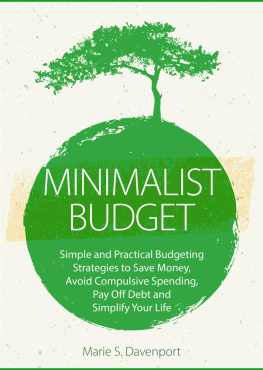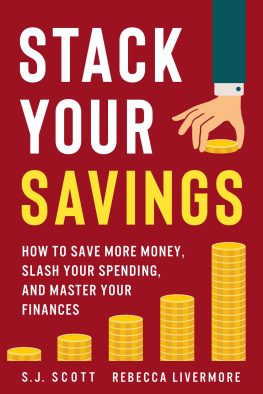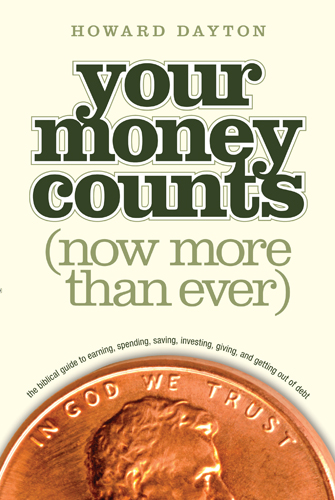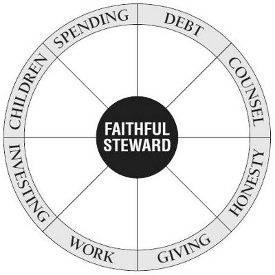Your Money Counts: The Biblical Guide to Earning, Spending, Saving, Investing, Giving, and Getting Out of Debt
Copyright 1996 by Compass-Finances Gods Way. All rights reserved.
Revisions and new chapter 2011 by Howard L. Dayton Jr. All rights reserved.
Some of this material previously appeared in Your Money: Frustration or Freedom? Published by Tyndale House Publishers, copyright 1979 by Howard L. Dayton Jr.
Designed by Dean H. Renninger
Unless otherwise indicated, all Scripture quotations are taken from the New American Standard Bible, copyright 1960, 1962, 1963, 1968, 1971, 1972, 1973, 1975, 1977, 1995 by the Lockman Foundation. Used by permission.
Scripture quotations marked NIV are taken from the Holy Bible, New International Version, NIV. Copyright 1973, 1978, 1984 by Biblica, Inc. Used by permission of Zondervan. All rights reserved worldwide. www.zondervan.com.
Scripture quotations marked TLB are taken from The Living Bible , copyright 1971 by Tyndale House Foundation. Used by permission of Tyndale House Publishers, Inc., Carol Stream, Illinois 60188. All rights reserved.
Scripture quotations marked NKJV are taken from the New King James Version. Copyright 1982 by Thomas Nelson, Inc. Used by permission. All rights reserved. NKJV is a trademark of Thomas Nelson, Inc.
Scripture quotations marked KJV are taken from the Holy Bible , King James Version.
Scripture quotations marked AMP are taken from the Amplified Bible , copyright 1954, 1958, 1962, 1964, 1965, 1987 by the Lockman Foundation. Used by permission.
Library of Congress Catalog Card Number 95-83819
ISBN 978-1-4143-5949-6
To Bev, my wife,
Gods choice gift to our family
To Matthew, my beloved son,
and to Danielle, a joy
To Jim Seneff, without his vision
this book would never have been conceived
To Will Norton, without his skill
this book would never have been born
To Tim Manor, who is closer than a brother,
and George Fooshee, my mentor
To the Compass-Finances Gods Way family, precious co-laborers,
you mean more to me than I can ever say
One
The Problem
A llen and Jean Hitchcock decided to end their marriage of 24 years.
In anticipation of the divorce settlement, Allen began to review the familys financial records. As he sorted through the files, he came across an old faded check made out to the hotel where he and Jean had stayed on their honeymoon. Another check had paid for an installment on their first car. He picked up still another check and remembered with fatherly pride how he had written it out to the hospital when their daughter was born. And then there was the down payment on their first home...
After several hours of sorting through their financial records, Allen realized how much he and his wife had invested in their marriage. He paused, deep in thought for several minutes. Then he closed the file and dialed his wifes number. After an awkward exchange he blurted out the reason for his call. Would she work with him to rebuild their marriage?
While a family crisis such as Allen and Jeans may be foreign to some of us, the message of their familys finances is common. It is the story of our lives. It tells of our values, how much we save, what we spend, to whom we give. In fact, our bank statements tell us more about our priorities than does anything else.
Thats why Jesus talked so much about money. Sixteen of the 38 parables were concerned with how to handle money and possessions. Indeed, Jesus Christ said more about money than about almost any other subject. The Bible offers 500 verses on prayer, fewer than 500 verses on faith, but more than 2,350 verses on money and possessions.
The Lord said a lot about it because He wants us to know His perspective on this critical area of life. He dealt with money matters because money does matter .
Two
The AnswerT he B ible I s a B lueprint for L iving
I was sliding papers and reports into my briefcase when the phone rang on my desk. It was 5:30 p.m., and I was getting ready to go home after a long day of paperwork and personal conferences. I was tired. Reluctantly, I picked up the phone.
Hello, Howard. This is Allen Hitchcock.
I felt a pang of embarrassment. I had neglected to return his earlier call. He sounded depressed, and I made a lame apology for not calling him back.
Jean and I considered a divorce, but we decided to try to work it out, he said, his voice sounding strained.
Their financial problems were on the verge of destroying their marriage. He asked if we could meet to discuss their situation. We had become acquainted at church two years before, when they had moved from St. Louis to Orlando. Allen earned a middle-income salary as an assistant manager for a department store, but he couldnt understand where the money went. They faced increasing expenses for their growing family, and in a few years they would need college tuition for the children. Neither he nor Jean could foresee a brighter future.
In addition, the Hitchcocks owed a substantial amount to retail stores, doctors, credit card companies, and their bank. They had a sizable home mortgage.
Because of their debts and their increasing daily expenses, the Hitchcocks shopped carefully, sometimes comparing half a dozen outlets for the best price. They used cents-off coupons at the supermarket. Allen did much of the automobile maintenance, and Jean avoided buying expensive convenience foods. But the family faced a critical problem. Jean and Allen did not have a clear guideline for handling money. They never had been able to budget their spending. They seldom decided not to buy what they wanted, and they had no plan to save or invest for the future.
I understood their predicament. Several years before, a friend, Jim Seneff, and I found ourselves making daily financial decisions for our expanding businesses and young families without a scriptural point of reference. To be the best husbands and the best businessmen we could be, we felt compelled to do a thorough study of what Scripture said about money. Together we read the entire Bible, locating each of the 2,350 verses that dealt with money and arranging those verses by topics. Then we put this information into a seminar and presented it at our church. The response was remarkable. People bombarded us with questions and described several areas of intense frustration. Other churches asked for the seminar, and through the years the seminar developed into the Compass-Finances Gods Way small group studies, which are today conducted in churches throughout the nation.
It is through these small group studies that many people like the Hitchcocks have been helped. We have found that most peopleindeed, most Christianseither dont know or have not applied Gods financial principles to their lives. Nevertheless, applying these principles is crucial for three reasons.
1. How we handle money affects our fellowship with the Lord.
In Luke 16:11 we read, If therefore you have not been faithful in the use of worldly wealth, who will entrust the true riches to you? In this verse Jesus equates how we handle our money with the quality of our spiritual life. If we handle our money properly according to the principles of Scripture, our fellowship with Christ will grow stronger. However, if we manage money unfaithfully, our fellowship with Him will suffer.


